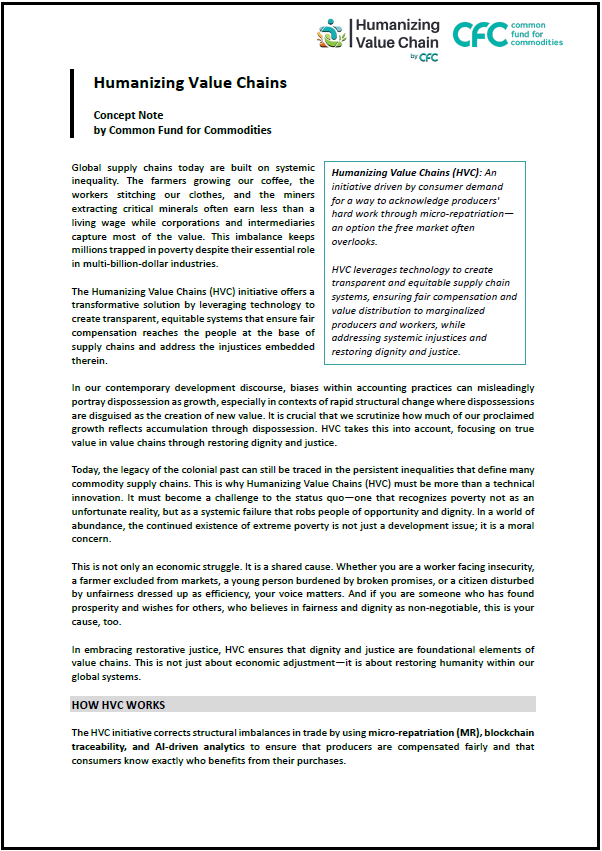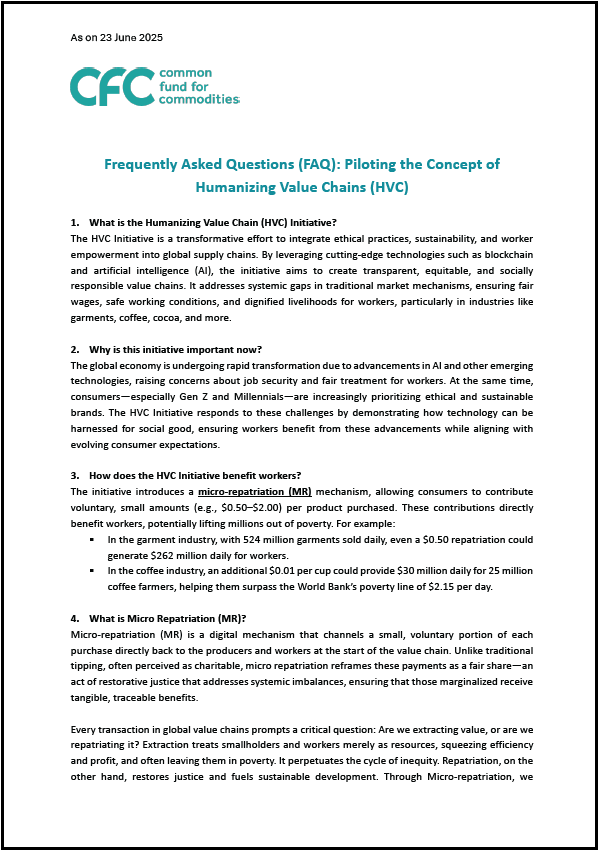Humanizing Value Chains
Humanizing Value Chains
Humanizing Value Chains
A Fairer Future, Built into Every Transaction
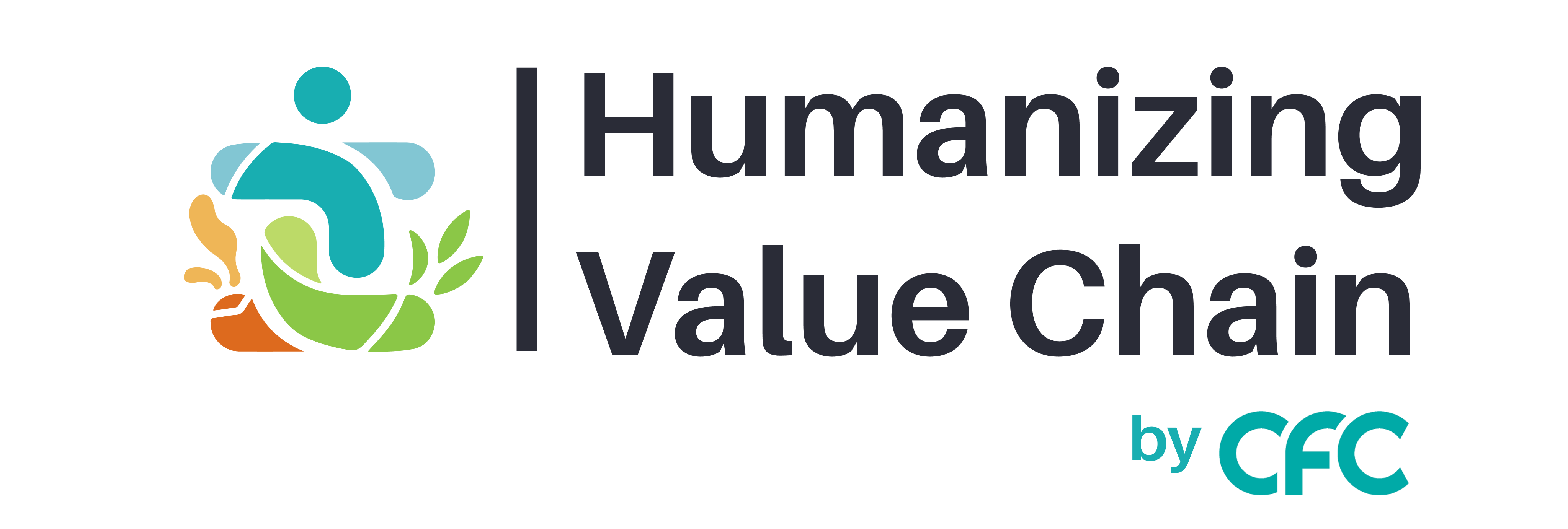

The Humanizing Value Chains (HVC) initiative represents a radical rethinking of global trade—one that shifts power from opaque, extractive systems to a model where dignity, transparency, and equitable value distribution are foundational. By integrating micro-repatriation (MR), blockchain traceability, and AI-driven fairness audits, HVC doesn’t just tweak the existing system—it rewrites the rules of who benefits and how.

- Traditional CSR or fair trade often acts as "guilt premiums"—small add-ons that don’t fundamentally alter value distribution.
- Micro-repatriation flips this by making equity a default consumer choice, not an afterthought. A $1 direct contribution with each purchase is frictionless but accumulates into meaningful income redistribution.
In our contemporary development discourse, biases within accounting practices can misleadingly portray dispossession as growth, especially in contexts of rapid structural change where dispossessions are disguised as the creation of new value. We must scrutinize how much of our proclaimed growth reflects accumulation through dispossession. HVC takes this into account, focusing on true value in value chains through restoring dignity and justice.
Today, the legacy of the colonial past can still be traced in the persistent inequalities that define many commodity supply chains. This is why Humanizing Value Chains (HVC) must be more than a technical innovation. It must become a challenge to the status quo—one that recognizes poverty not as an unfortunate reality, but as a systemic failure that robs people of opportunity and dignity. In a world of abundance, the continued existence of extreme poverty is not just a development issue; it is a moral concern.
This is not only an economic struggle. It is a shared cause. Whether you are a worker facing insecurity, a farmer excluded from markets, a young person burdened by broken promises, or a citizen disturbed by unfairness dressed up as efficiency, your voice matters. And if you are someone who has found prosperity and wishes for others, who believes in fairness and dignity as non-negotiable, this is your cause, too.
In embracing restorative justice, HVC ensures that dignity and justice are foundational elements of value chains. This is not just about economic adjustment; it is about restoring humanity within our global systems.
There is a Story Behind Every Product
Every product we touch, every shirt, every banana, every chocolate bar has a human story behind it. It’s the story of the woman sorting cocoa beans under the sun, the young man tending cotton fields, or the family running a cooperative mill in a remote village. These stories are often untold, hidden behind barcodes and price tags.
HVC brings those stories to the forefront. Through digital tools, we can trace products to their origin, learn who made them, ensure they receive their fair share, and share our gratitude. In doing so, we restore dignity and visibility to the producers who make modern life possible.
Structural Issues in the Global Value Chain
The persistent issue of low farmgate prices in global value chains remains one of the most significant challenges facing smallholder farmers and low-wage workers in commodity-dependent economies. Despite being the backbone of multi-billion-dollar industries, these producers barely make ends meet, while multinational corporations, traders, and intermediaries reap most of the economic benefits. The absence of fair pricing mechanisms, transparency, and equitable value distribution has left smallholders trapped in cycles of poverty, unable to invest in productivity-enhancing resources or improve their livelihoods.
Despite decades of discussion on trade liberalization and global commodity price stabilization, farmgate prices remain alarmingly disconnected from international markets. Smallholder farmers, who produce a significant share of the world’s food and raw materials, continue to suffer under a market system that deprives them of bargaining power. Often operating within a “take-it-or-leave-it” structure, they are forced to accept prices dictated by intermediaries or global buyers, exacerbating rural poverty and deepening economic insecurity.
Minimum Wages aren’t Enough
A living wage is the minimum income necessary for a worker and their family to afford a decent standard of living. Unlike statutory minimum wages, a living wage reflects real-world costs, covering essentials such as food, housing, healthcare, education, and transport, with a small margin for savings or emergencies.
Persistently low farmgate prices mean that even the most essential human needs go unmet. Smallholder farmers struggle to cover production costs and afford decent housing, education for their children, and access to medical care. Traditional financial systems often exclude them, limiting their access to working capital and protection against market volatility. As a result, poverty becomes entrenched, opportunities diminish, and rural producers are left vulnerable to exploitation.
Redefining How the Value Flows
At its core, HVC addresses one of the most enduring failures in global trade: the chronic undervaluation of the people who make production possible. Through three strategic technologies, HVC offers a practical alternative. For too long, global value chains have been engines of extraction, drawing value from the communities who produce the world’s goods and concentrating prosperity far from their origin. We flip the script: instead of merely extracting, we actively return value where it was created. This is not only a remedy to injustice, but also a smart reinvestment in the long-term resilience of supply chains.
Through three strategic technologies, HVC offers a practical alternative:
- Micro-repatriation reframes these payments as a fair share, an act of restorative justice that repairs systemic imbalances and ensures that the most marginalized receive tangible, traceable benefits.
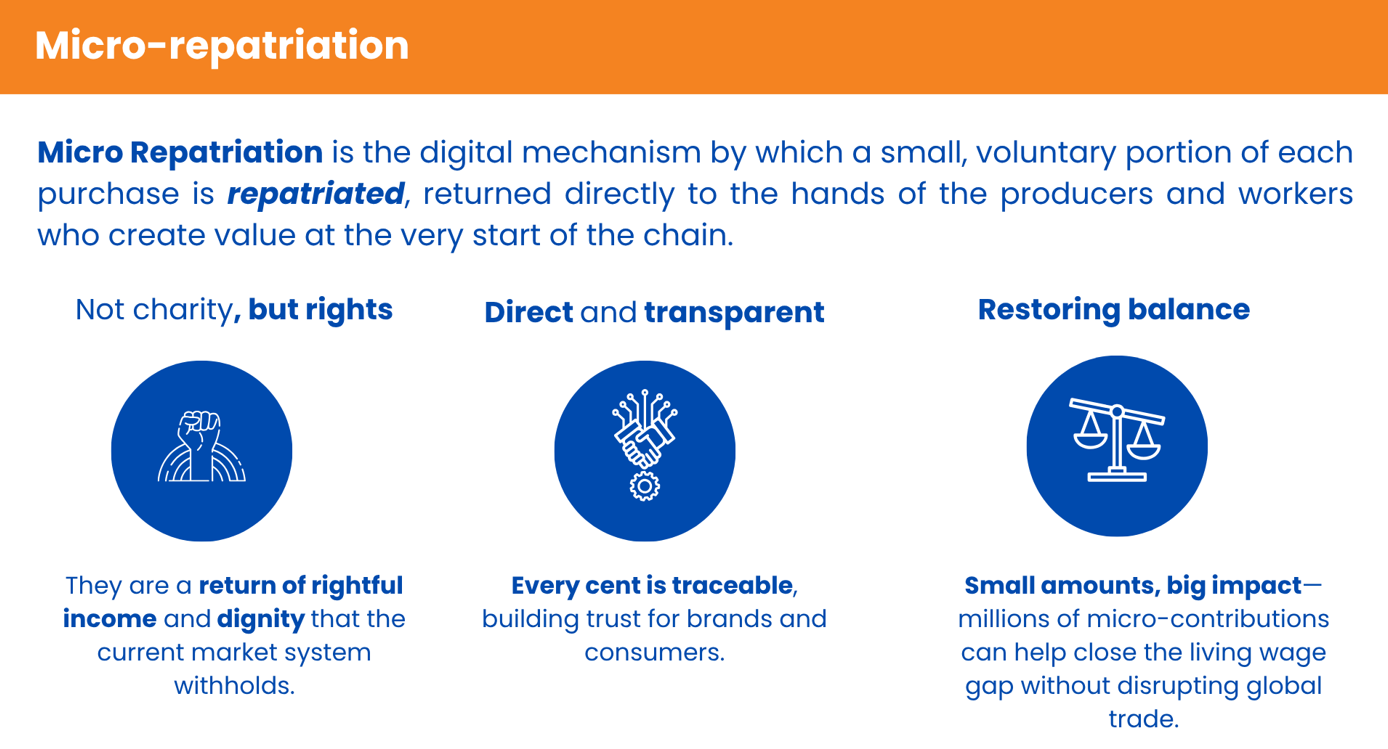
- Blockchain as a trust revolution makes every step in the supply chain verifiable, recorded, and visible. HVC’s tamper-proof ledger turns every transaction into a verifiable social contract: "Your $1 reached Carlos, a coffee farmer in Colombia, increasing his daily wage by 15%." This real-time impact visibility could redefine consumer trust, making exploitation harder to hide.
- AI as the Watchdog for Living Wages, where Fairtrade labels aim to improve incomes, but often fall short of guaranteeing a living income in practice. HVC’s AI analyses elements of value chains like local living costs (housing, food, healthcare), actual wages paid, and possible Price distortions in the supply chain. This forces brands to align pricing with reality, not just optics.
Extraction treats smallholders and workers as resources, from whom efficiency and profit must be squeezed, often leaving them behind in poverty. Repatriation, on the other hand, recognizes their foundational role and ensures that value flows back to those who generate it. Micro-repatriation is the mechanism that makes this practical, visible, and scalable: a direct, transparent return of value to the producers, farmers, and labourers who are all too often excluded from the upside of global trade.
These innovations shift the moral responsibility for fairness to those who benefit most from the system, consumers, brands, and global institutions, ensuring that fairness is not an afterthought but a feature.

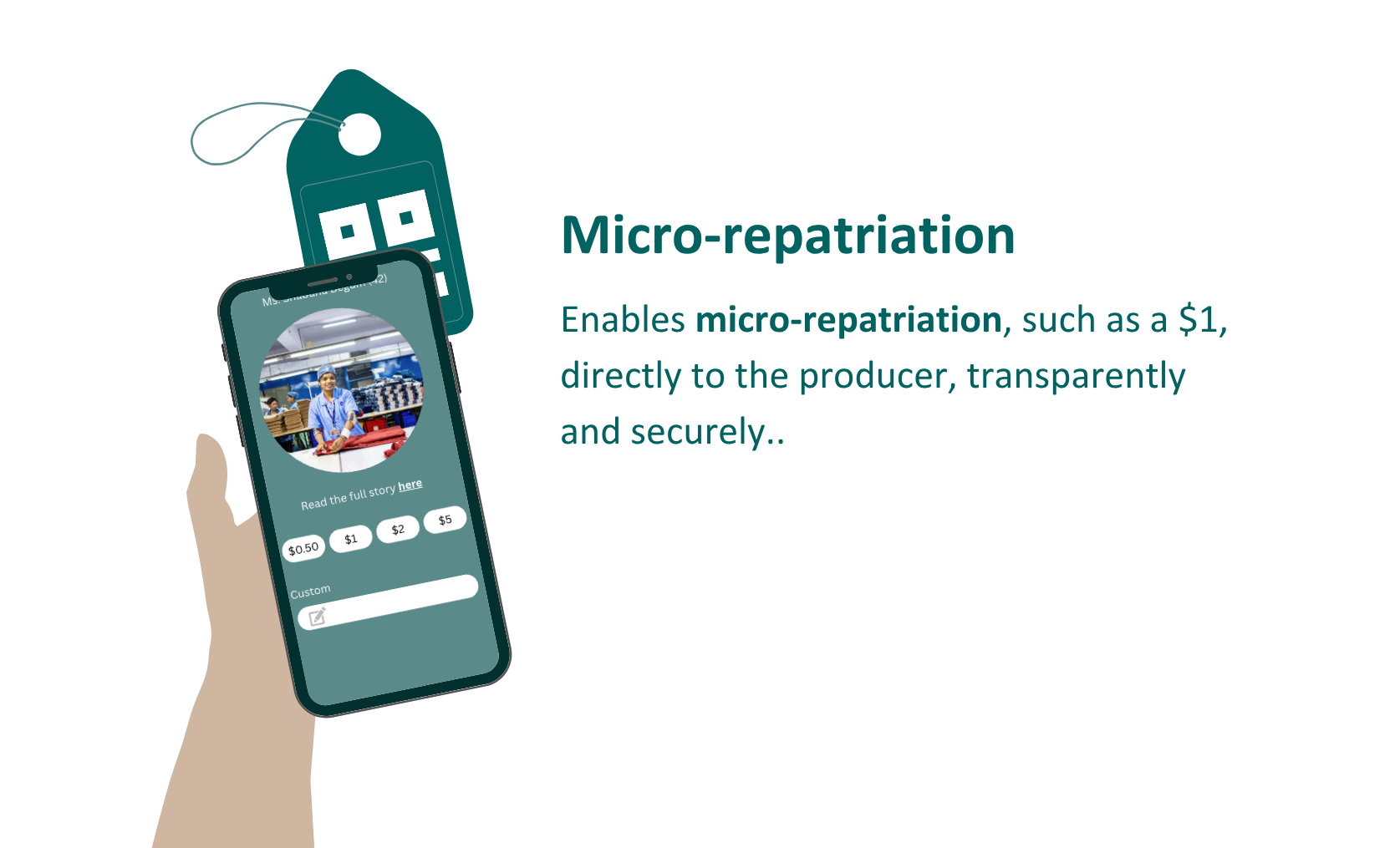

The Bigger Vision: A Post-Exploitation Economy
HVC isn’t just about better wages—it’s about dismantling the colonial legacies in global trade, where:
- Producers in the Global South subsidize cheap goods for Global North.
- Brands profit from ethical branding without systemic change.
- Consumers unknowingly participate in exploitation due to opacity.
By making every transaction a direct value transfer, HVC could create a self-reinforcing loop:
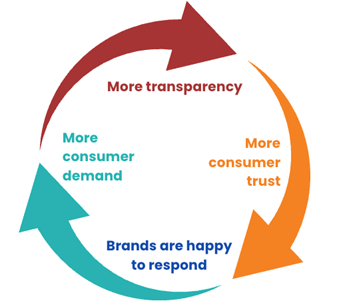
A Shared Value Approach
This approach creates systemic benefits:
- Workers gain greater financial security and access to digital financial services, empowering them to move closer to achieving their dream of earning a living wage.
- Consumers gain ethical purchasing power and measurable impact.
- Businesses future-proof themselves against tightening sustainability regulations (such as the EU’s Digital Product Passport) while earning consumer trust.
- Governments and NGOs gain tools to enforce fair trade and track SDG progress.
Challenges to Scale
- Consumer Behavior: Will shoppers consistently opt in, or will MR feel like another fee?
- Corporate Resistance: Brands reliant on cheap labor may lobby against wage transparency.
- Data Rights: Ensuring AI wage analysis doesn’t exploit vulnerable producers further.
Towards a Fairer Future
HVC shows us that justice can be engineered, transaction by transaction, value chain by value chain. It invites us to reject polite excuses and tired justifications. It reminds us that value must serve everyone, not just those at the top.
Extraction perpetuates the cycle of poverty. Repatriation restores justice and fuels sustainable development. Through Micro-repatriation, we choose to repatriate value, to honour those who create it, not just those who sell it.
HVC positions the CFC at the forefront of ethical trade innovation. It builds a future where every transaction is an act of repatriation, not just consumption, where global value chains don’t just circulate goods, but redistribute justice.
The Ultimate Question
HVC’s model can’t win as a passive tool—it must become a consumer-producer alliance that:
- Makes exploitation more expensive for brands than fairness (via lawsuits, tariffs on opaque supply chains).
- Rewards participation (e.g., tax breaks for HVC-compliant companies).
The biggest barrier isn’t tech or economics—it’s imagination. Can we envision trade where "profit" includes dignity as a KPI? If so, HVC’s real innovation is proving that transparency + collective action can rewrite capitalism’s code. If successful, this could mark the beginning of trade that truly works for not just the powerful few.
Would love to hear your thoughts, do you see this as a viable future, or are there structural barriers we’re underestimating?
” We take care of the VALUE in ‘value chains’.”

